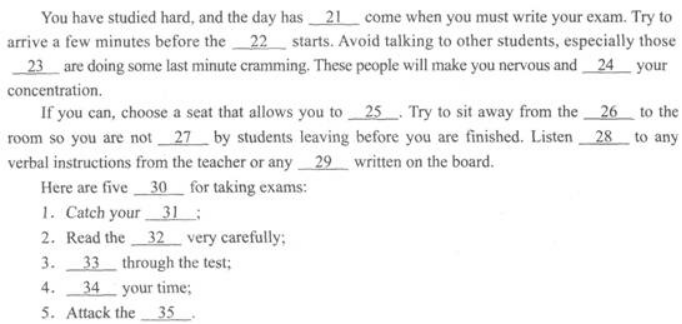The sound of footsteps on the floor()the downstairs neighbors.A、irritatedB、botheredC、annoyedD、interrupted
题目
The sound of footsteps on the floor()the downstairs neighbors.
A、irritated
B、bothered
C、annoyed
D、interrupted
相似考题
参考答案和解析
参考答案:C
更多“The sound of footsteps on the floor()the downstairs neighbors.A、irritatedB、botheredC、an ”相关问题
-
第1题:
Can you hear This?
When something creates a sound wave in a room or an auditorium, listeners hear the sound wave directly from the source. They also hear the reflections as the sound bounces off the walls, floor, and ceiling. These are called the reflected wave or reverberant(反射的)sound, which can be heard even after the sound is no longer coming from the source.
The reverberation time of an auditorium is determined by the volume or interior size of the auditorium. It is also determined by how well or how poorly the walls, ceiling, floor, and contents of the room (including the people) absorb sound. There is no ideal reverberation time. Because each use of an auditorium calls for different reverberation. Speech needs to be understood clearly: therefore rooms used for talking must have a short reverberation time. The full-sound performance of music such as Wagner operas or Mahler symphonies should have a long reverberation time. The light, rapid musical passages of Bach or Mozart need a reverberation time somewhere between.
Acoustic problems often are caused by poor auditorium design. Smooth, curved reflecting surfaces create large reflections. Parallel(平行的)walls reflect sound back and forth, creating a rapid, repetitive pulsing effect. Large pillars(柱)and corners can cause acoustic shadows as the sound waves try to pass around the object. Some of these problems can be solved by using absorbers and reflectors to change the reverberation time of a room. For example, hanging large reflectors, called clouds, over the performers will allow some sound frequencies to reflect and others to pass to achieve a pleasing mixture of sound.
文章(41~45)
This passage is mainly about_____A.sound waves and their effects.
B.the types of music orchestras play.
C.walls of an auditorium.
D.the design of an auditorium.答案:D解析: -
第2题:
At midnight,we were aroused by a knock at the door.A:irritated
B:awakened
C:ansen
D:annoyed答案:B解析:本题考查的是对近义动词的辫析能力。本句话的意思是:“午夜时分,我们被敲门声弄醒。”句子中的画线部分意为“唤醒,引起”。irritate意为“激怒,使发怒”,如:His remarks irritated me a little.他的话让我有点恼火。awaken意为“唤醒,醒来”,与原句画线部分最接近,如:Please awaken me at seven.请于七点叫醒我。arise意为“站立,出现”,如:She anises from hen chair when he entered the room.当他进房间时她从持子上站了起来。annoy意为 “使苦恼,骚扰”,如:It annoyed me to be kept waiting so long.让我等了这么久,真让人生气。 -
第3题:
大学生利用课余时间打工
the future of press
Can you hear This?
When something creates a sound wave in a room or an auditorium, listeners hear the sound wave directly from the source. They also hear the reflections as the sound bounces off the walls, floor, and ceiling. These are called the reflected wave or reverberant(反射的)sound, which can be heard even after the sound is no longer coming from the source.
The reverberation time of an auditorium is determined by the volume or interior size of the auditorium. It is also determined by how well or how poorly the walls, ceiling, floor, and contents of the room (including the people) absorb sound. There is no ideal reverberation time. Because each use of an auditorium calls for different reverberation. Speech needs to be understood clearly: therefore rooms used for talking must have a short reverberation time. The full-sound performance of music such as Wagner operas or Mahler symphonies should have a long reverberation time. The light, rapid musical passages of Bach or Mozart need a reverberation time somewhere between.
Acoustic problems often are caused by poor auditorium design. Smooth, curved reflecting surfaces create large reflections. Parallel(平行的)walls reflect sound back and forth, creating a rapid, repetitive pulsing effect. Large pillars(柱)and corners can cause acoustic shadows as the sound waves try to pass around the object. Some of these problems can be solved by using absorbers and reflectors to change the reverberation time of a room. For example, hanging large reflectors, called clouds, over the performers will allow some sound frequencies to reflect and others to pass to achieve a pleasing mixture of sound.
文章(1~5)
This passage is mainly about_____
A.sound waves and their effects.
B.the types of music orchestras play.
C.walls of an auditorium.
D.the design of an auditorium.答案:D解析: -
第4题:

请在第_____处填上正确答案。A.upset
B.bothered
C.excited
D.annoyed答案:B解析:这样在你答完试卷之前离开考场的学生就不会影响你了。 -
第5题:
When young people file their income tax form, they will often follow in their parents' footsteps.A.Right
B.Wrong
C.Not mentioned答案:A解析:
